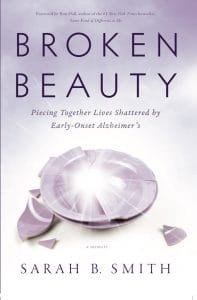The following essay is an excerpt from the book Broken Beauty: Piecing Together Lives Shattered by Early-Onset Alzheimer’s. It is available for pre-order now on Amazon and in stores January 15, 2019.
BY SARAH B. SMITH 
I’ll never forget the day my mom almost ate glass. After her diagnosis, my parents moved from Houston to Dallas and bought a beautiful home a few blocks away from my family. I was thrilled to have them closer, and for the first time in years, Mom and I spent so much more time together. Whether we were sitting in carpool lines to pick up my kids or driving to Starbucks to order her favorite drink, an iced soy chai, we were inseparable.
One morning I was folding my parents’ laundry while Dad poured Mom a bowl of cereal. He carried it into the living room so she could eat it in her favorite chair. He’d just come back into the kitchen to fix her a hot cup of coffee when we both heard the sound of breaking glass.
“Ahhh!” Mom yelled. “Shoot!”
Dad and I ran into the living room to see what had happened. Mom had dropped her cereal, and the rim and one side of the bowl had broken into pieces. The main part of the bowl, however, was still intact.
She picked up several pieces of glass and put them back in the bowl, and then she scooped up another spoonful of raisin bran and brought it to her mouth.
“Becky!” Dad shouted. “Don’t eat that!”
“What?” Mom asked. “It’s fine. It’s just a few pieces. I can still eat out of it.”
“It’s broken, Becky. If you eat a piece of glass, you could choke or kill yourself.”
Dad couldn’t grasp why she didn’t understand this. It was common sense, after all.
Still, he was patient and loving and regained his composure quickly. “Here,” he said gently. “Let me get you a new bowl.”
She looked up at him and back down at what she thought was a perfectly fine bowl of cereal and caved. “Okay. I think it’s a waste, but fine.” She held out the bowl, which shook in her hands, splashing more milk onto the floor. Because of her disease, she couldn’t grip things well anymore. Whenever she held a coffee cup, a drinking glass, or a bowl, it leaned sideways. We continually followed her around with a paper towel to clean up her spills.
“Oh, Mama,” I said, trying to keep the mood light. “What are you doing here? Are you stirring up trouble and making messes again?”
She chuckled, then cleared her throat. “I guess so. I’m always doing something.” She knew something was wrong with her, but she was still trying to cover it up.
As she stood to help me clean up, I noticed a tiny piece of glass sticking out of her ring finger.
“Mom, hang on. Let me get that glass out of your skin.”
She sat back down and, holding her finger steady, I carefully pinched the glass with my fingernails and pulled it out. On my knees, I looked up at her. She looked back into my eyes.
“Mom, I love you. You know that, don’t you?”
“Yes, Daughter. I know.”
She smiled softly and continued to stare into my eyes with complete trust, believing that I would take care of her and help her get through this journey. I smiled back, blissfully unaware how hard that journey would soon become.
It all happened so fast. One moment, my mom was the funny, strong, opinionated woman she’d always been, blowing air through the gap in her front teeth to make a whistle you could hear for blocks. Then, seemingly overnight, not only had she forgotten how to whistle, but she also had a hard time stringing together coherent sentences.
Early-onset Alzheimer’s disease (EOAD) is the cruelest disease I have ever seen. Unpredictable and uncontrollable, it follows its own rules. The disease lives in the moment. It had taken over my mom like a Category 5 hurricane, but sometimes the storm would pass, the clouds would part, and she would be lucid again. During these moments of calm, we’d have beautiful conversations.
Even in these brief exchanges, I’d find myself savoring every word—good or bad, positive or negative—spoken from my mom’s lips. And when words were nonexistent, her eyes never failed to express love.
My journey with my mom has been wonderful, painful, terrifying, life-affirming, crazy-making, and beautiful. Every day is different, and there is no consistency. I’m only 42, but over the past several years, I’ve walked through a lifetime’s worth of heartache and hope—as have my dad, my husband, my children, and the many friends who’ve walked beside me. There is so much brokenness all around us, but there’s beauty too. With every new crack or fissure, I peek through to see the light. With every new break, I cup my hands around an even greater love.
God gives me glimpses and moments of hope. He teaches me to trust Him along the way. He shows me, through Mom’s eyes, how much He loves me. And when I touch her face and hands, I feel a softness and a sense of peace within me. Mom knows how much I love her. Although she can’t express her love for me the way she once did, I know that when we are together, our love only grows stronger.
Don’t get me wrong: this situation is painful and not at all pretty. There are days that break my heart. But then some of it is so very beautiful, like when I get to dance with Mom. She may not remember what a chai latte is or have any recollection of all the times we went to Starbucks together, but when I dance with her for twenty minutes, it is amazing. We lock eyes, the disease temporarily disappears, and we feel the connection we have had since she carried me on her hip during my toddler years.
As I’ve walked beside Mom through her incurable disease, I’ve begun to see love with a clearer, deeper understanding. There are so many kinds of love—love between spouses, parents, children, caretakers, friends, siblings, and God’s love. I wouldn’t be where I am today without those kinds of love.
ABOUT THE AUTHOR:
Sarah Bearden Smith is a housewife, mother of three, and a woman of deep faith, who has lived in Texas all her life. She was born and raised in the Houston area until her departure for the University of Texas at Austin, where she was a speech communications major and varsity cheerleader. After graduation, she remained in Austin, working in the software and high-tech industry. She and her husband and children live in Dallas, Texas, where they actively serve in assisted living and memory care facilities and support organizations such as Council for Life, Alzheimer’s Association, the Women’s Alzheimer’s Movement, and Community Bible Study. Sarah and her family are members of Watermark Community Church.

